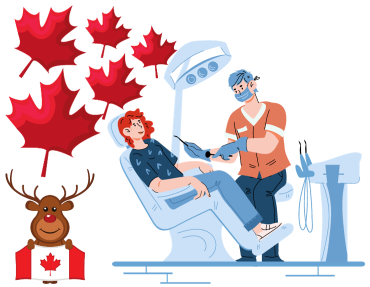Welcome to our comprehensive guide to dental care in New Brunswick. Whether you’re a long-time resident or a newcomer to the province, taking care of your dental health is an important aspect of overall well-being. In this guide, we’ll cover everything you need to know about dental care in New Brunswick, from the importance of understanding the New Brunswick Dental Fee Guide to finding the right dentist for your needs. We’ll also explore the costs associated with routine and advanced dental procedures, as well as tips for saving money on dental care and navigating dental insurance in the province. So sit back, relax, and let’s dive into the world of dental care in New Brunswick.
The Importance of Knowing the New Brunswick Dental Fee Guide
The New Brunswick Dental Fee Guide is a crucial tool for anyone seeking dental care in the province. This guide provides a comprehensive list of the fees that dentists in New Brunswick are permitted to charge for their services. Knowing this information is essential for patients to ensure they are not overcharged for their dental procedures. It is also important for patients to be aware of the fee guide when selecting a dentist, as some may charge higher fees than others. Additionally, understanding the fee guide can help patients budget for their dental expenses and avoid any unexpected costs. The New Brunswick Dental Society updates the fee guide annually to reflect changes in the cost of living and advancements in technology and techniques. Patients should be aware that while dentists are not required to follow the fee guide, it is widely accepted as a benchmark for fair pricing. Patients can also use the fee guide to compare prices between different dental practices, allowing them to make an informed decision when choosing a provider. Overall, understanding the New Brunswick Dental Fee Guide is an important step in ensuring patients receive fair and affordable dental care in the province.
Overview of Dental Procedures Covered by the Fee Guide
The New Brunswick Dental Fee Guide covers a wide range of dental procedures that are essential for maintaining good oral health. The guide includes several categories of procedures, including diagnostic services, preventive services, restorative services, endodontic services, periodontal services, prosthodontic services, oral and maxillofacial surgery, and orthodontic services.
Diagnostic services are the first step in any dental treatment plan. They include procedures such as x-rays, examinations, and consultations with the dentist. Preventive services are designed to help patients maintain good oral health and prevent the onset of dental problems. These services include teeth cleanings, fluoride treatments, and sealants.
Restorative services are used to repair damaged or decayed teeth. These services include fillings, crowns, bridges, and dentures. Endodontic services focus on the treatment of the tooth’s pulp and root canal therapy. Periodontal services address gum disease and include scaling and root planing.
Prosthodontic services involve the replacement of missing teeth with dental implants or other prosthetic devices. Oral and maxillofacial surgery deals with conditions affecting the mouth, jaws, face, and neck. Orthodontic services correct misaligned teeth and jaws using braces or other orthodontic appliances.
Overall, the New Brunswick Dental Fee Guide covers a comprehensive range of dental procedures necessary for maintaining optimal oral health. It is important to understand these procedures and their associated costs to make informed decisions about your dental care.
How Much Can You Expect to Pay for Routine Dental Work?
Routine dental work is an essential aspect of maintaining good oral health. The cost of such procedures can vary depending on the dentist’s experience, the location of the clinic, and the complexity of the treatment. In New Brunswick, the cost of routine dental work is relatively affordable compared to other Canadian provinces. A standard check-up and cleaning can cost anywhere between $80 to $150, while a filling can range from $100 to $300. However, these prices may vary depending on the materials used for the filling. For example, composite fillings are more expensive than amalgam fillings. X-rays are also a part of routine dental work and can cost around $25 to $75 per x-ray, depending on the type required.
It is important to note that these prices are based on the fees recommended by the New Brunswick Dental Fee Guide. Dentists may charge higher or lower fees depending on their practice’s location and other factors. It is always best to inquire about the costs before booking an appointment with a dentist.
Patients who have dental insurance should check their policy coverage as routine dental work may be covered under their plan. In some cases, insurance policies may cover up to 100% of routine dental procedures. It is essential to understand what your insurance covers to avoid any unexpected costs.
Overall, routine dental work in New Brunswick is relatively affordable compared to other provinces in Canada. Patients should always inquire about fees before booking appointments and check their insurance policies for coverage options. Regular visits to the dentist for routine procedures can help prevent more significant dental issues in the future and save money in the long run.
The Cost of Advanced Dental Procedures in New Brunswick
Advanced dental procedures can be costly, and it’s important to understand the expenses involved before deciding on a treatment plan. In New Brunswick, the cost of advanced dental procedures varies depending on the type of treatment required. For example, the cost of dental implants can range from $1,500 to $5,000 per tooth, while root canal therapy can cost between $800 and $2,500 per tooth. Other advanced dental procedures such as orthodontics, periodontal surgery, and wisdom teeth removal can also come with a significant price tag.
It’s important to note that the cost of advanced dental procedures may not be covered by dental insurance plans in New Brunswick. Patients should review their policy carefully and understand what is covered and what is not. Some insurance plans may cover a portion of the cost, while others may require patients to pay out-of-pocket for the entire amount. It’s also worth noting that some dentists may offer payment plans or financing options to help patients manage the cost of treatment.
To save money on advanced dental procedures in New Brunswick, patients should consider shopping around for different providers and comparing prices. However, it’s important not to sacrifice quality for cost. Patients should choose a dentist who is experienced and qualified to perform the procedure they need. They should also ask for a breakdown of costs upfront and make sure they understand all fees associated with the procedure before moving forward.
In conclusion, advanced dental procedures in New Brunswick can be expensive, but patients have options when it comes to managing the cost. By understanding what is involved in each procedure and reviewing insurance coverage carefully, patients can make informed decisions about their oral health and finances.
Dental Insurance in New Brunswick: What You Need to Know
Dental insurance is an essential aspect of dental care in New Brunswick. It helps individuals to cover the cost of dental procedures and treatments. However, it’s important to note that not all dental insurance plans are created equal. Some plans may offer comprehensive coverage while others only cover basic procedures. Before selecting a dental insurance plan, it’s crucial to understand what your plan covers and what it doesn’t. Most dental insurance plans in New Brunswick have an annual limit, which means that the insurer will only pay up to a certain amount per year. It’s essential to know this limit and ensure that you don’t exceed it to avoid paying out-of-pocket expenses.
Another factor to consider when choosing dental insurance in New Brunswick is the waiting period. Some insurance plans require a waiting period before they cover certain procedures. This means that you may have to wait for a specified period before you can get coverage for certain dental treatments. Understanding the waiting period is crucial as it helps you plan your dental care effectively.
Finally, it’s important to know if your dentist accepts your dental insurance plan. Not all dentists accept all types of dental insurance plans, so it’s important to check with your dentist before choosing a plan. You can also ask for recommendations from friends or family members who have similar dental needs as yours.
In conclusion, understanding dental insurance in New Brunswick is crucial for anyone seeking comprehensive dental care. Knowing what your plan covers, its annual limit, the waiting period, and if your dentist accepts it can help you make informed decisions about your dental health and save money on dental care expenses.
Tips for Saving Money on Dental Care in New Brunswick
Dental care in New Brunswick can be expensive, but there are ways to save money. One tip is to prioritize preventative care. Regular dental check-ups and cleanings can help prevent costly dental procedures in the future. Another way to save money is to ask about payment plans or financing options for more extensive procedures. Many dental offices offer these options to help patients manage the cost of their care. It’s also important to shop around and compare prices when looking for a dentist. Don’t just choose the first one you come across, do some research and find a dentist who offers competitive pricing and high-quality care. Additionally, consider using a dental savings plan or discount program. These programs can offer significant savings on dental procedures and services. Lastly, be sure to take advantage of any insurance benefits you have. Understand your coverage and use it to the fullest extent possible. By following these tips, you can save money on dental care in New Brunswick without sacrificing quality or neglecting your oral health.
Finding a Dentist in New Brunswick: How to Choose the Right One
Finding the right dentist in New Brunswick can be a daunting task, but it’s important to take the time to choose the best one for your dental needs. Start by asking friends and family for recommendations. They may have had positive experiences with a particular dentist and can provide valuable insight into their services. You can also check online reviews and ratings from previous patients to get an idea of the dentist’s reputation. When you have a list of potential dentists, research their credentials, including education, experience, and any specializations they may have. Look for a dentist who is licensed by the New Brunswick Dental Association and has a good standing with the organization. It’s also important to consider the location of the dental practice and their availability. Choose a dentist who is conveniently located and has flexible hours that fit your schedule. During your initial consultation with a potential dentist, ask about their approach to dental care and how they communicate with their patients. Make sure you feel comfortable with their communication style and that they listen to your concerns. Finally, consider the cost of their services and whether they accept your dental insurance plan. Finding the right dentist may take some time, but it’s worth investing in a professional who will provide quality dental care and help you maintain good oral health.
As we wrap up our comprehensive guide to dental care in New Brunswick, we hope that you have gained valuable insights into the dental fee guide, cost of procedures, dental insurance, and tips for saving money. It is important to prioritize your dental health and seek professional care regularly. Finding the right dentist can make a world of difference in ensuring that your oral health needs are met. Remember, prevention is always better than cure. By following good oral hygiene practices and visiting your dentist regularly, you can avoid costly and painful dental problems down the road. We encourage you to take action today and schedule your next dental appointment. How do you plan on prioritizing your dental health moving forward?






Leave a Reply